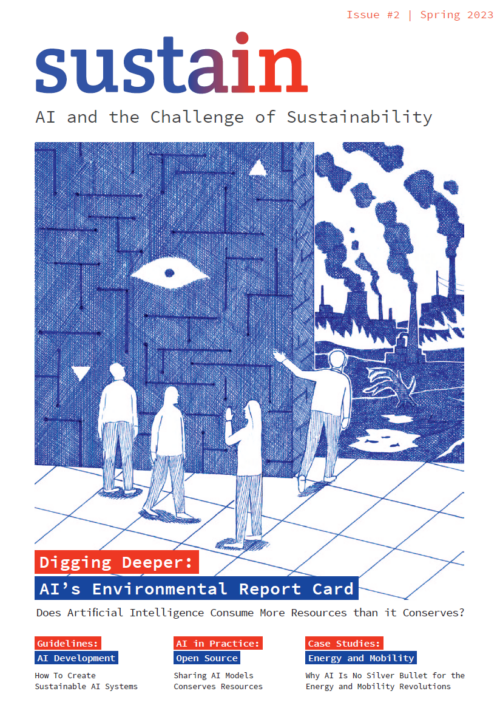The Opportunities and Risks of AI in Energy Supply
Interview on the use of AI in energy supply with Friederike Rohde and Josephin Wagner from the Institute for Ecological Economy Research (IÖW).

It has been said time and again that the transition to a carbon-neutral economy can only succeed with the help of Artificial Intelligence. But it still isn’t clear whether AI systems can actually deliver the desired benefits. As part of the research project “SustAIn: The Sustainability Index for Artificial Intelligence,” researchers from the Institute for Ecological Economy Research (IÖW) analyzed the diverse interests that shape the discussion about the opportunities and risks associated with AI in energy supply. In doing so, they examined 22 strategy and position papers from the German, European and international context in addition to conducting interviews with experts.
What hopes do stakeholders have for AI when it comes to energy supply?
Josephin Wagner: Our study shows that they primarily expect the use of AI to generate considerable opportunities. AI systems are designed to make energy supplies more efficient – by optimizing processes, for example, processing data in real time or generating forecasts. Automation can also help determine early on whether equipment needs to be repaired. Stakeholders are hoping to reduce costs and maximize profits through the use of AI. At the same time, AI is also expected to drive the transition to clean energies and provide solutions that account for the escalating complexity of the energy system. As the number of producers and consumers in the system grows and the energy sector becomes increasingly digital, the amount of data needing to be processed will expand significantly. Stakeholders believe that AI systems will be particularly adept at managing the mass of data.
Friederike Rohde: Our analysis shows that they expect AI applications to optimize energy consumption through datadriven load and feed-in forecasts and to improve management based on that data. The optimized adjustment of power generation and consumption through better forecasting can reduce the burden on power grids. Stakeholders thus believe that AI systems can make an important contribution to the security of supply and system stability. AI will also be used to better match renewable energy to energy needs and integrate it into the energy system. AI applications are expected to provide the necessary precision needed for optimization services. The automated and adaptive processing of consumption data is seen as a necessity for providing these services at a reasonable cost in the first place.

“In the 22 documents we analyzed on the role
of AI in the transition to clean energy, the
opportunities are given greater emphasis than the risks.”
What risks have stakeholders identified?
Josephin Wagner: The documents we analyzed addressed classic risks – in the field of cybersecurity, for example – but also the energy and resource consumption required to operate AI systems and their infrastructure. In the expert interviews, though, we also addressed the question as to which stakeholders are actually benefiting most from the increasing use of AI. The interviewees identified the inherent risk that especially those who already have a lot of data, such as large transmission system operators, could stand to benefit the most. Small players like municipal utilities, on the other hand, would first need to build the skills and data infrastructure necessary to reap the benefits of intelligent optimization. The interviewees were also critical of the fact that financial and human resources are currently being invested disproportionately in the development of AI in the energy sector. They argue that the further development of AI applications in other areas has been stalled by the fixation on the energy sector, even though the benefits of AI applications in energy supply are far from proven.
What attracts greater attention in the discussions: the opportunities or the risks?
Friederike Rohde: In the 22 documents we analyzed on the role of AI in the transition to clean energy, the opportunities are given greater emphasis than the risks. However, the interviews with experts also revealed the crux of this technology: On the one hand, people want AI to help them better deal with
systemic complexity. On the other, though, the use of AI also makes the system even more complex, which further increases the risks. But this ambivalence is rarely discussed.
Josephin Wagner: In terms of the sustainability of AI technologies in the energy system, our case study makes it clear: The amount of energy required for training AI models to optimize energy consumption management is negligible. Thus, it makes a lot of sense to rely on smart optimization and AI technologies
in the energy system. Nonetheless, the positive expectations people have are exaggerated, because there are still hurdles that AI cannot remove – such as the development of an appropriate regulatory framework or the participation of citizens in the design of the energy system. The reality is that many pilot projects fail due to the regulatory framework. These conditions must be shaped in parallel with the development of the technology so that AI can actually make a positive contribution to the transition to a carbon-neutral economy.
Friederike Rohde is a sustainability researcher and technology sociologist at the Institute for Ecological Economy Research (IÖW). She is pursuing her PhD at the TU Berlin and works on sociotechnical futures in the context of digital transformation, social innovations and algorithmic decision-making systems.
Josephin Wagner is a research associate at the Institute for Ecological Economy Research. In the research field of environmental economics and policy, she focuses on digitalization and social change as well as on the economic and institutional analysis of environmental policies.
The interview was published in the second issue of the SustAIn magazine. For more articles and facts about AI and sustainability, download the whole magazine as PDF here.
